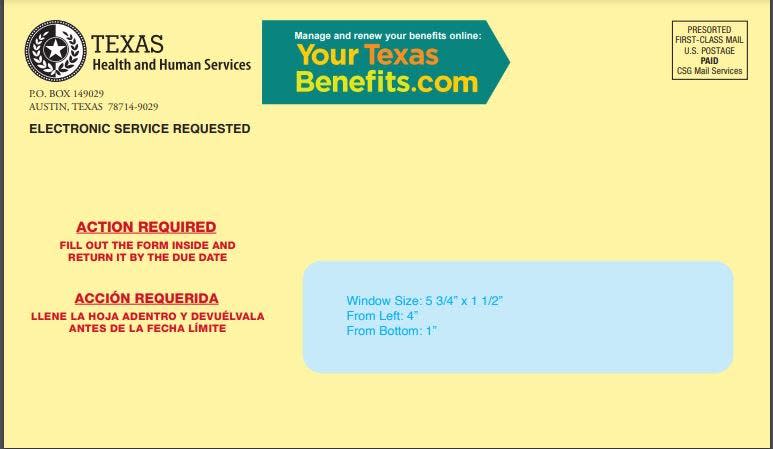Texas among states being audited by federal CMS for Medicaid terminations. What we know.

The Texas Health and Human Services Commission is being audited by the federal Centers for Medicare & Medicaid Services, part of a continuing oversight of certain states, the centers and the commission has announced.
CMS said it is looking at the monthly data reported by states to CMS and it will conduct "targeted audits of eligibility termination determinations, as appropriate, to ensure state compliance with all federal requirements," said CMS spokesperson Sara Lonardo. CMS would not elaborate on how many states were being audited.
In Texas, CMS is looking at the people who were denied Medicaid coverage Aug. 1-Aug. 31, a whistleblower group of staff members at the state commission said.
CMS has previously worked with the Texas health commission to ensure technical problems were fixed. This summer, more than 90,000 people in Texas had their coverage reinstated after being improperly disenrolled, Lonardo said.
Tiffany Young, a public information officer at the commission, told the Statesman by email that "through a combination of manual or IT solutions, HHSC reinstated those individuals’ benefits to ensure no gap in coverage."
Why is the audit of particular interest now?
Medicaid is medical insurance available for pregnant women, children and people with disabilities who make below a certain income. For a family of four in Texas, their income must be less than $3,083 a month. For a pregnant woman with a family of four, it is less than $4,579 a month.
During the pandemic health emergency, the number of people enrolled in Medicaid or the Children's Health Insurance Program in Texas increased by almost 50%, Young said. They were given continuous coverage, meaning they didn't have to verify income annually.
Beginning in April, all states have had to reverify recipients who had continuous coverage during the pandemic because the pandemic health emergency has ended. Medicaid recipients must supply information like current income to maintain coverage.
More: What's gone wrong with Texas' Medicaid unwinding? Inside the problems with state agency.
How are reverifications going?
The commission released new numbers of applications processed in August on Sept. 8:
1,023,501 beneficiaries were contacted via letter or email to renew. They will have 60 days to respond. CMS gave the commission permission to increase that time from 30 days because of previous problems.
214,948 applications are completed.
54,584 applications are pending.
194,610 people had their benefits renewed; 176,648 by filling out a renewal form, 17,962 by ex parte using other information databases.
124,998 were deemed ineligible.
203,322 were terminated because they failed to respond.
246,796 were waiting for their application to be processed.
A long process: Texas says it needs 12 months to properly reverify everyone receiving Medicaid
What are the areas of concern?
The new data show a backlog of applications that have not been processed, said Texans Care for Children and other advocates.
“When kids are eligible for health insurance and their families have jumped through every hoop the state puts in front of them, our state leaders need to make sure those applications are processed on time so kids can go to the doctor or get their medications," said Diana Forester, director of Health Policy at Texans Care for Children.
“When children get kicked off for procedural reasons, they are not referred to other affordable health care options, like CHIP or HealthCare.Gov," said Graciela Camarena, child health outreach program director at Children’s Defense Fund-Texas.
"We’re seeing so many families who aren’t receiving their notices to renew," she said. "When they do receive a notice, it’s to let them know a decision has already been made, and their coverage is ending in one or two weeks — which simply isn’t enough time for them to figure out how to keep their child’s health insurance.”
More: Texas Democrats send letter to federal agency over state dropping people from Medicaid
How long will reverification last?
The state commission said it will need all 12 months to redetermine eligibility for both the people who had continuous coverage and the people who were having to verify their information annually. It's almost 6 million people, the state commission said.
The size of the renewal process is too big for the commission to reach every Medicaid recipient on its own, said Dr. Angela Moemeka, the chief medical officer of Texas Medicaid for Blue Cross and Blue Shield of Texas, the largest insurer in the state.
Early in the process, the state reached out to insurance companies and medical providers to enlist their help to reenroll clients, she said, adding, "Our reach is very deep. We're able to assist them." That includes helping clients get reenrolled or start a new application if they get dropped, she said,
The state is verifying people who had continuous coverage in three cohorts: The first group received letters in spring and were mostly likely to no longer qualify because they may have aged out of care or were no longer pregnant. The second group received letters this summer and are most likely to transition to a different type of coverage.
The third group, who are beginning to receive letters now, is anyone left, including children on Medicaid and older adults and people with a disability.

Common problems for all states
CMS sent a letter Aug. 30 to all states to use the ex parte system to verify eligibility of a Medicaid recipient based on information the states keep. That includes applications for SNAP benefits for food and income information from state employment agencies. In Texas, that's the Texas Workforce Commission.
That letter also reminded states that if they determine that one family member is eligible for benefits, it can use that information for all family members.
"Since April 1, 2023, no eligible individuals have been disenrolled from Medicaid or CHIP in Texas due to a failure to account for the individual’s eligibility status, independent of that of others in the household," Young said.
For CMS' part, it will continue to do audits and send out letters to ensure compliance, Lonardo said: "CMS will continue to act swiftly to ensure that people are connected to the coverage that’s right for them. Ensuring every American has health care remains a top priority of this Administration.”
This article originally appeared on Austin American-Statesman: Texas Health and Human Services audited for Medicaid terminations

